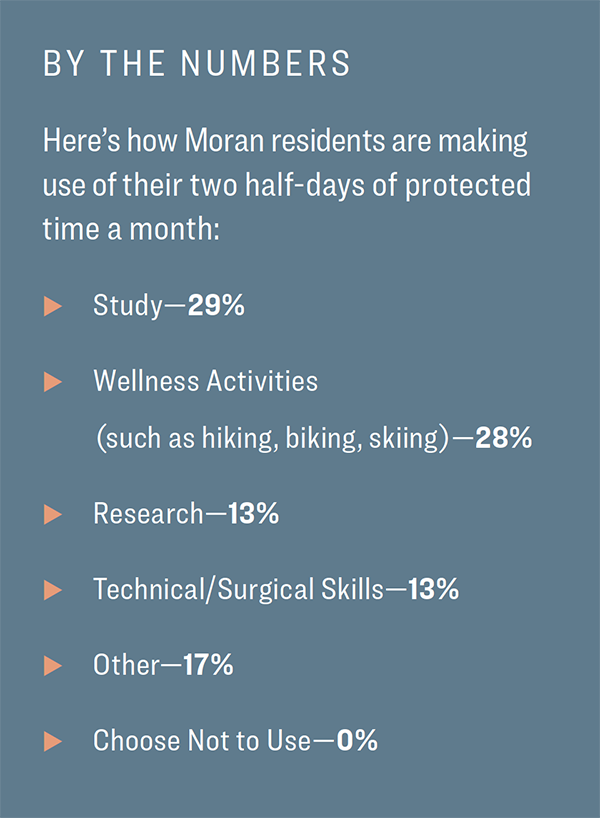
Medical residencies have long had a reputation as rewarding, albeit stressful experiences.
But national survey results published in 2018 revealed a troubling snapshot of the pressures on ophthalmology residents, in particular, and pushed issues of burnout, depression, and even suicide into a national spotlight.
Among the most-cited factors contributing to resident burnout: lack of control over schedules and lack of time for self-care.
The findings were at odds with the perceptions of most program directors. Another survey by the same research team revealed that only 25 percent of program directors expressed concern about resident wellness.
The survey results, along with many others, opened the door to change. As eye centers across the country acknowledge burnout and its consequences, the John A. Moran Eye Center is taking unique steps to address the issues with real solutions.
Protected Time
Moran Eye Center Director of Wellness Griffin Jardine, MD, knows all about resident burnout.
"My ophthalmology residency was brutal in terms of lack of control over my schedule or time for any self-care—as it is for most residents," he said.
"And it doesn’t stop. During my fellowship, I worked for a full year with no vacation, but I did get to take half of a sick day for a root canal. It was one of those happy-unhappy situations. I couldn’t believe I was sitting there in the dentist’s chair, loving the downtime."
Jardine acknowledges that wellness is a complicated issue, and generational differences play a role.

"Among most health care providers, personal wellness has been a backburner issue, as in ‘don’t be selfish, just pay attention to your patients.’ But the reality is, data show that increased burnout correlates to worse patient outcomes and more errors," said Jardine.
With the support of Moran CEO Randall J Olson, MD, Jardine and Moran’s education team launched a wellness program for residents to augment university-wide efforts for faculty and staff.
A key component of Moran’s program is "academic protected time" during the regular workweek.
"Yoga and mindfulness are nice, but they don’t change the burnout rate," Jardine noted. "Residents want some control over their time, and that is what we’ve been able to negotiate. They now have two half-days a month to do whatever they like."
Resident feedback has been positive.
"Administrative half-days have been an extremely positive influence," one resident said in a survey. "Even though many of these half-days are not spent on wellness activities, they contribute to wellness because I have some carved-out time to work on things like research or extra study time."
Mocha with a Mentor
Residents Ariana Levin, MD, and Mike Burrow, MD, created a second initiative for Moran’s Wellness Program.
Called "Mocha with a Mentor," it bypasses the formal pairing of mentors and residents and instead empowers residents to seek out a faculty member they admire.
The team created an email invitation to send on behalf of residents to faculty, indicating that a resident would like to meet and treat the faculty member (with a department-issued $10 gift card) for one-on-one time. Residents can ask the mentors about their careers, research, and ophthalmology in general—or anything else on their minds.
"It’s been a hit," said Griffin Jardine, MD, Moran's director of wellness. "Eighty percent of the meetings last for over 20 minutes. Faculty are flattered, residents get their undivided attention, and it goes a long way in terms of making meaningful connections."